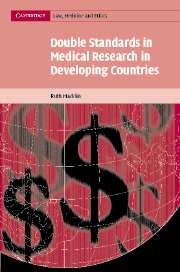Book contents
- Frontmatter
- Contents
- Acknowledgments
- 1 International research contested: controversies and debates
- 2 Maintaining ethical standards in research
- 3 Striving for justice in research
- 4 Avoiding exploitation
- 5 Providing safeguards: informed consent and review of research
- 6 Making drugs affordable
- 7 Respecting, protecting, and fulfilling human rights
- 8 Striving for a single standard
- Index
6 - Making drugs affordable
Published online by Cambridge University Press: 12 November 2009
- Frontmatter
- Contents
- Acknowledgments
- 1 International research contested: controversies and debates
- 2 Maintaining ethical standards in research
- 3 Striving for justice in research
- 4 Avoiding exploitation
- 5 Providing safeguards: informed consent and review of research
- 6 Making drugs affordable
- 7 Respecting, protecting, and fulfilling human rights
- 8 Striving for a single standard
- Index
Summary
An underlying premise in arguments defending recent clinical trials is that the chief way of providing medical benefits to populations in resource poor countries is to develop cheaper drugs – presumably affordable, but probably less effective than those considered to be the “best current treatments” in industrialized countries. It is no doubt true that some newly developed drugs may turn out to be as good as or even better than the best current preventive or therapeutic methods, while at the same time being much cheaper and therefore more affordable to the governments or the people in developing countries. Nevertheless, the controversy that has raged over the use of placebo controls in research aimed at finding cheaper drugs relies on one formulation of the research question: Is the intervention being studied better than nothing? (when nothing is what the majority of such populations normally get).
Defenders of the placebo-controlled methodology insist that a different research question would be inappropriate: Is the experimental drug as good, or almost as good, as the best treatment used in the industrialized world? One line of defense contends that because the healthcare system currently provides nothing, a placebo-controlled design is ethically acceptable and contextually relevant. Another line of argument maintains that the answer obtained by comparing the experimental drug with the best current medication is less scientifically reliable than results obtained from a design using placebo controls.
- Type
- Chapter
- Information
- Double Standards in Medical Research in Developing Countries , pp. 163 - 192Publisher: Cambridge University PressPrint publication year: 2004

